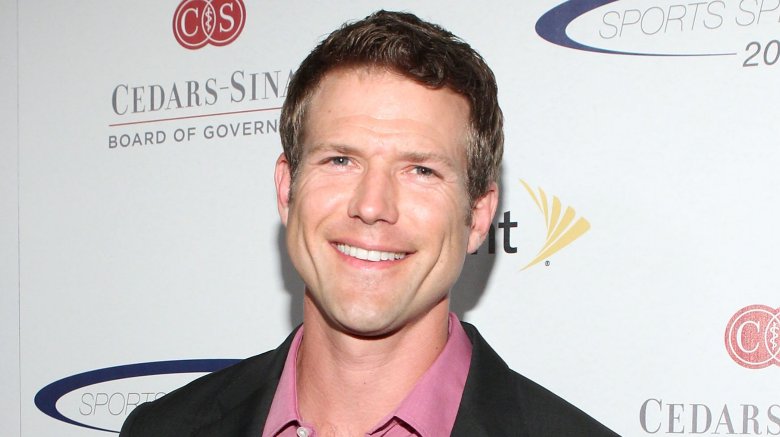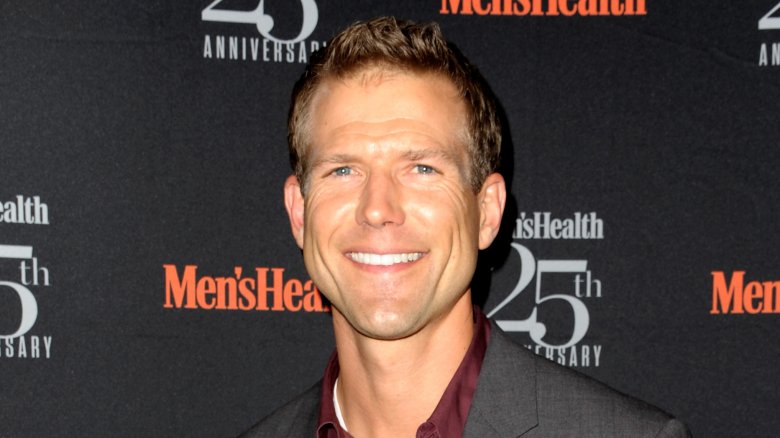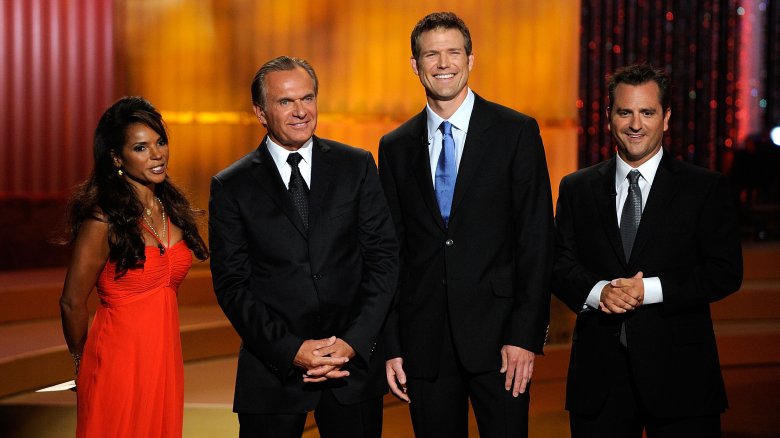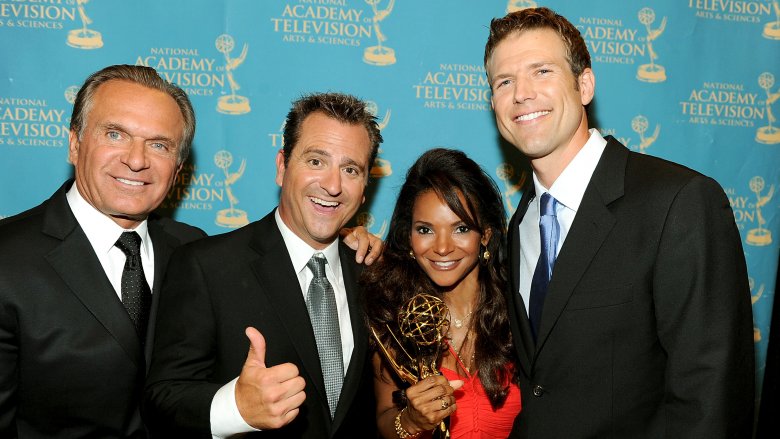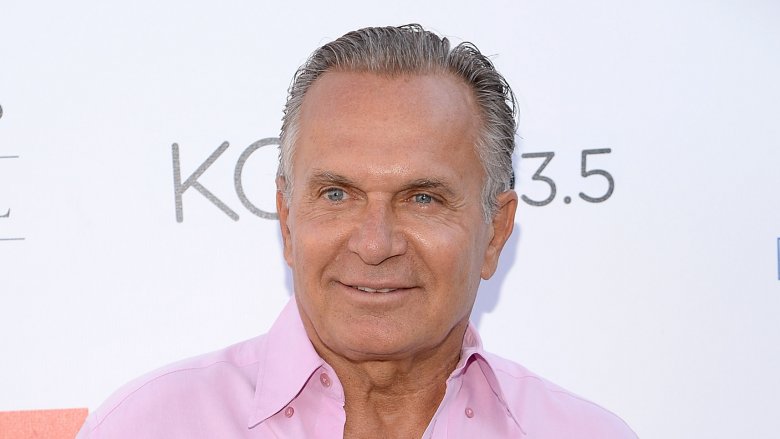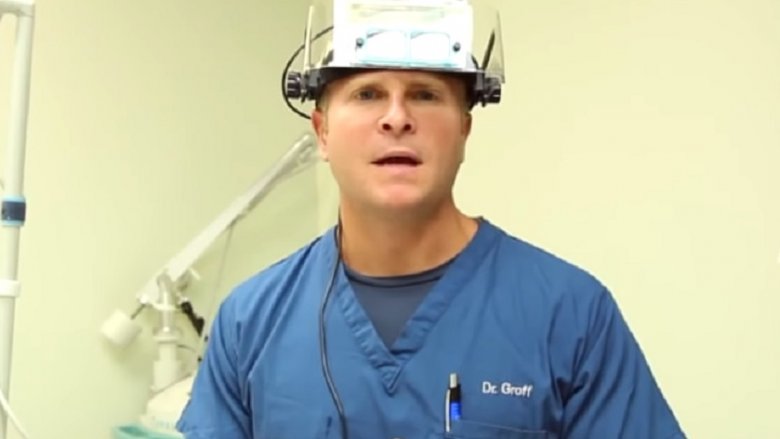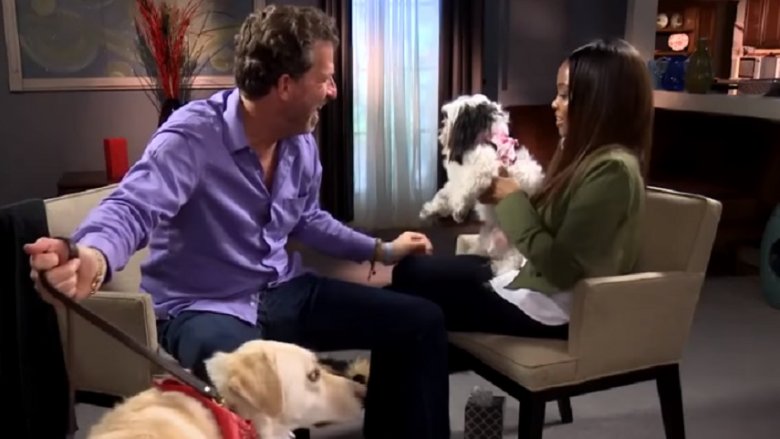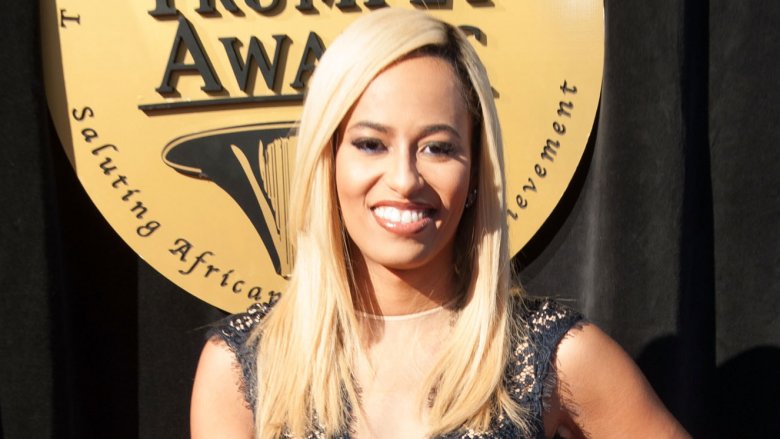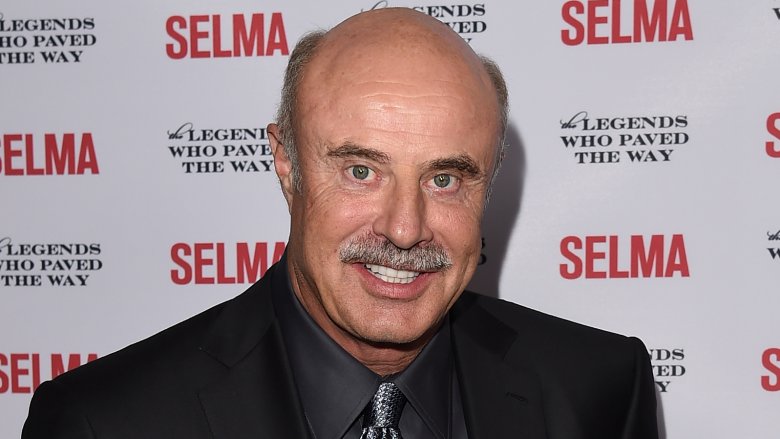The Untold Truth Of The Doctors
Among all the judge shows, game shows, soap operas, talk shows where real people throw chairs at each other, talk shows where celebrities tell Ellen DeGeneres how much they love her and vice versa, and reruns of Law and Order: SVU, there's a daytime television staple that's a little bit different than the rest. Since 2008, The Doctors has been a slightly more high-minded chat show, dispensing medical advice, health information, and horror stories of the human body gone wrong to millions of viewers.
Led by Dr. Travis Stork, The Doctors is a panel talk show — various physicians of various disciplines have sat in the show's four chairs — so it's sort of like The View, but with a health and wellness focus that resembles Dr. Phil or The Oprah Winfrey Show. However, at the end of the day, The Doctors is a TV show, not med school or a medical journal, which means behind the scenes things are as odd, scandalous, and off-putting as a Doctors episode about cyst-popping.
Here are some things you might not have known (or even suspected) about The Doctors.
Dr. Stork is not Dr. Love
Emergency medicine specialist Dr. Travis Stork (who really should have been an obstetrician so new parents could say a Stork delivered their baby,) is no stranger to carefully choreographed nonfiction television. Seeing as how he's a decently attractive, clean-shaven, white guy who is also a doctor, it was probably inevitable that he'd land the chance to be the bachelor on The Bachelor, which happened back in 2006.
Quite the catch on paper, more than two dozen ladies vied for his heart, but he could pick only one woman to promise to maybe marrying, and that woman was a kindergarten teacher named Sarah Stone. While an official proposal didn't go down on TV, Dr. Stork and Stone did begin a relationship, but then things ended the way most Bachelor romances end: Stork and Stone split up not long after the cameras stopped rolling.
Stork got back on the dating horse and soon landed himself a famous girlfriend: American Idol winner and country superstar Carrie Underwood. That didn't last either, but Dr. Stork did eventually get married. He wed a non celebrity, pediatrician Dr. Charlotte Brown, but divorced after three years.
The O'Walsh factor
You've got to be two things to make it as a doctor on The Doctors. First, and most importantly, you must be a doctor (or at the very least, a medical expert) of some kind. Second, you need to be a polished, media-savvy individual who knows how to conduct yourself on television. Dr. Wendy Walsh fits the bill. She's a psychologist with impeccable professional credentials and an extensive TV resumé to boot. As far as the latter, she's hosted segments and shows on Investigation Discovery, CNN, HLN, and Fox News, where she was a contributor to The O'Reilly Factor.
In 2017, Dr. Walsh's experiences with Bill O'Reilly were exposed amidst the veteran news host's fall from grace. According to a report in The New York Times (summarized by the The Washington Post), Walsh agreed to meet O'Reilly for dinner in 2013 at the Hotel Bel-Air in Los Angeles. While they dined, O'Reilly allegedly told Dr. Walsh that he could get her a high-paying gig as a more prominent Fox News contributor. After the plates were cleared, O'Reilly supposedly invited Walsh to his hotel room; Dr. Walsh said no, and that's when, allegedly, he got mad. According to the Times, Walsh claimed O'Reilly "became hostile, telling her that she could forget any career advice he had given her and that she was on her own." O'Reilly even allegedly told Dr. Walsh that "her black leather purse was ugly," which is just petty.
That amazing product they're talking about comes with a price
We've all come to accept ads on television. While they're often a jarring break in the action, they're also the reason why broadcast TV is free to watch, so what are you going to do? At least there's a clear delineation between content and commercial, except when there's not, and that's where product placement comes into play. Companies will pay a show's production company to insert a mention, image, or discussion of a product into the show itself. It can be awkward — like on an episode of Bones, where the crime-fighters take a moment out of their day to discuss the fancy features on a new Prius — or it can be so seamless as to be insidious.
According to a study conducted by doctors published in Health News Review in 2018, some of those miracle products and effective treatments touted on The Doctors might only be discussed because the show is being paid to discuss them. The study examined 18 episodes of The Doctors and found that two-thirds had commercials which related to that show's content and that nearly 85 percent of episodes featured hosts mentioning products by name. It's an especially sketchy — and potentially dangerous — practice for medical shows that purport to be focused on dispensing medical advice and valuable information.
Take their advice with a very large grain of salt
Not only is a lot of information and advice touted by The Doctors potentially just thinly-veiled advertisements, but it would seem that a substantial amount of medical claims made by the show are just that: claims, as in they haven't proven to be medically valid.
In 2014, a team of doctors analyzed what was actually being said on a series of medical TV talk shows (such as The Doctors). Their findings, detailed in an academic paper called "Televised medical talk shows — what they recommend and the evidence to support their recommendations: a prospective observational study," were published by the British Medical Journal. The paper revealed some shocking truths about the often fake "information" dispensed by these real doctors on The Doctors. A solid 14 percent of the time, the evidence that doctors said made a product or practice work contradicted the actual, legitimate medical community's findings, and 24 percent of the time, there was no previously reported or published medical basis whatsoever for the claims made.
The study would suggest that the show apparently just makes up some of this stuff.
Suit up!
Hey, look, just because the panelists on The Doctors are serious medical professionals, it doesn't mean that they can't have a little fun! Also, they've got five hours of air time a week to fill up, and there's only so much publicly-palatable and relevant health, fitness, and nutrition-related information to share. That means the show has to resort to vaguely on-topic stunts.
In 2012, the show aired a segment on those "sumo suits," inflatable recreational outfits worn by duos to mock-fight; they were the No. 1 fun activity offered by cool, college-town bars back in 1997 or so. Anyway, The Doctors said that popping on a sumo suit was a great way to get a little exercise, and exercise is a healthy thing doctors encourage. The show's Dr. Drew Ordon donned one of the suits to demonstrate, but in a lawsuit filed in 2014, he claims the bit left him injured.
Dr. Ordon reportedly took issue with the company that loaned out the sumo outfits. He alleges the business was reckless because it allegedly didn't properly train him on how to wear the suit or warn him about the possibility of being injured in the suit. Sounds like he should host The Lawyers, not The Doctors.
When a dress becomes a suit
Dr. Rachael Ross (not to be confused with Dr. Monica Chandler) left The Doctors in 2016, but she still got to go to that year's Daytime Emmy Awards on behalf of her Daytime Emmy-nominated show. Getting ready for the big event was apparently a mess of the highest order, according to a stylist Ross employed named Ali Levine. The dresser outfitted Ross in a specially selected, one-of-a-kind baby-blue gown made by designer Pia Gladys Perey ... which Levine says Ross ruined by getting her makeup smeared all over it.
Levine says she came up with some other, just as good options for Dr. Ross to wear to the awards, but instead, the Doctors doctor allegedly came unglued, rejected all the other dresses, and then fired Levine. The stylist filed a lawsuit, claiming Dr. Ross still owes her $559.75 for her time.
Zits incredible the show blemished this guy's life
Part of the appeal of The Doctors is that it's more than a bunch of eggheads in scrubs talking about medical stuff — the show brings on real people to discuss and even treat their various and sundry aches, pains, and maladies.
One such person: a 21-year-old guy from Minnesota named Tyler Bowling. His journey to The Doctors began in 2009, when he contacted cosmetic surgeon Dr. William Groff about a laser treatment to remove the pearly penile papules that peppered his privates (aka pubic pimples.) Groff offered to waive the $4,500 free if Bowling would talk about his pearly penile papules on The Doctors. Bowling said he agreed, claiming he was told that The Doctors was an educational series for the medical community and not, in fact, a nationally-syndicated television show with a live studio audience.
When he found out the true nature of The Doctors, Bowling balked. He says Dr. Groff's secretary "proceeded to cajole, assuage, and persuade" him into doing the show anyway. Bowling says he was then rushed into signing release forms and thrown onto the set of The Doctors to talk about his genital abnormalities on television.
We know Bowling's account of how this all went down because it's detailed in the lawsuit he filed against Dr. Groff, his surgery center, and the production and distribution companies behind The Doctors. Bowling seeks monetary damages for invasion of privacy, fraud, and emotional stress for suffering "relentless embarrassment and harassment" over his appearance on the show.
When the show produced a dog-gone miracle
Psychology is a kind of medicine, and so it's fair game for the cast of The Doctors to cover deep-seated psychological issues on the show in the name of medical inquiry and potentially helping viewers. The show's resident OB/GYN, Dr. Nita Landry, allowed herself to be the patient and test subject on one occasion. The physician cited a lifelong fear of dogs so severe that she'd never once so much as even petted a pupper.
"Whenever I see a dog, my pulse speeds up and the only thing that I can think about is how to get away from that dog," Dr. Landry said, acknowledging that her phobia is both embarrassing and impractical, as she knows most dogs are fine, particularly those belong to her friends and family.
Her intensive therapy sessions with a "life strategist" named Gary Coxe were broadcast on The Doctors, which culminated with Coxe placing a puppy in Dr. Landry's lap. After some screaming and yelling of many bleeped-out words, she was able to hold the puppy. Barktastic!
Vax on, vax off
Certainly one of the most controversial and contentious medical debates over the past decade: to vax or not to vax. In short: a large grassroots movement has developed consisting of parents who refuse to inoculate their children against deadly, nearly eradicated diseases such as polio with routine, inexpensive vaccinations that have been standard practice in the United States for decades. The reasons: some anti-vaxxers say substances used in the vaccines lead to autism — a concept that's been widely debunked; others just don't want to inject their kids using the medical community's timeline without doing their due diligence and research first.
Though not vaccinating is still something of a fringe medical idea, one prominent TV doctor — Dr. Rachael Ross from The Doctors — is very tied up in the anti-vax movement. She's spoken at a number of anti-vaccination events and rallies, and a letter she wrote appears on the website of Vaxxed, an anti-vaccination documentary in which she apologizes for vaccinating children over the course of her career.
Dr. Phil is The Doctors' grandpa
TV history is loaded with successful spin-offs that grew so popular they nearly overshadowed their television parents. For example, The Simpsons began in 1987 as a series of animated vignettes on Fox's The Tracey Ullman Show; Frasier took a pretentious psychiatrist out of a Boston bar on Cheers and planted him in a Seattle high-rise; and Dr. Phil sprung out of a series of regularly scheduled psychology-fueled self-help segments hosted by Dr. Phil McGraw on The Oprah Winfrey Show. Similarly, The Doctors is also a spin-off, and it's a spin-off of Dr. Phil.
Panelists from what would become The Doctors appeared on Dr. Phil's show to discuss medical issues, and it was so popular that producers created a new show in 2008. That makes The Doctors a spin-off, but also a spin-off of a spin-off, an odd footnote in TV talk show history. (A third-generation spin-off is a scant concept in narrative TV, too. A rare example is how All in the Family begat Maude, which begat Good Times.)

